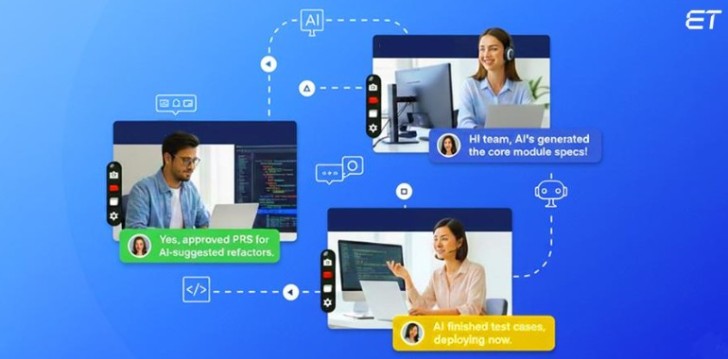AI software development outsourcing is no longer a trend, but a significant differentiator. Organizations are already leveraging AI-driven outsourcing to gain agility, elevate product quality, and unlock efficiencies that were previously out of reach with traditional models.
This blog explores how AI in outsourcing is reshaping development pipelines, redefining vendor relationships, and pushing businesses to rethink what they expect from their technology partners. If you're still measuring outsourcing success in terms of hourly rates or headcount, it's time for you to recalibrate.
Let’s get started!
From Traditional Outsourcing to Intelligent Collaboration
Previously, outsourcing software development meant handing off tasks to external teams to reduce costs and fill skill gaps in-house. But AI in software development outsourcing has transformed this equation completely.
We’re no longer just outsourcing labor, we’re outsourcing intelligence. AI-powered tools are enabling real-time code generation, smart bug detection, and automated testing that allow in-house and outsourced teams to collaborate more efficiently than ever. This shift isn’t just about faster delivery; it’s about building smarter, leaner development pipelines that respond in real-time to your project needs.
This results in a more strategic, value-driven partnership where AI augments human capabilities on both sides of the table.
From Code to Value: How AI Boosts Outsourcing AI Software Development
Integrating AI in software development outsourcing gives your business the upper hand in several ways. Here's how:

1. Smarter Use of Resources
AI automates repetitive coding, bug detection, and testing tasks, giving your developers more time to focus on innovation and architecture. This allows outsourced and internal teams to operate with greater precision and creativity, rather than being bogged down by manual workflows.
For instance, JPMorgan Chase reported that an AI coding tool increased the productivity of its software engineers by up to 20%.
2. Improved Code Quality
Machine learning models are now being trained to identify code bugs, flag vulnerabilities, and recommend optimizations in real-time. This gives you cleaner, more secure, and scalable codebases, reducing your long-term maintenance cost and the risk of post-deployment failures.
According to a report by Deloitte, AI-driven quality assurance tools can reduce the number of defects by up to 50%, leading to more reliable software products.
3. Faster Time-to-Market
AI-powered tools like predictive analytics and intelligent scheduling can foresee obstructions before they impact delivery. By identifying risk-prone modules early and suggesting alternate pathways, AI helps outsourced teams accelerate software rollouts while maintaining stability.
A study by McKinsey found that AI could increase productivity by up to 40% in software development tasks, significantly reducing time-to-market.
4. Reduced Development Costs
Through automation, AI reduces the human hours required for testing, documentation, debugging, and monitoring. This gives you a leaner, more efficient development process that significantly trims outsourcing costs, without sacrificing output quality.
5. Better Decision-Making with Predictive Insights
AI brings powerful data analytics with it. From sprint planning to resource allocation and vendor evaluation, decision-makers can now act on predictive insights, driven by real-time data, historical trends, and performance metrics.
6. Enhanced Scalability and Flexibility
Need to pivot mid-project? AI-powered development environments can scale efforts dynamically, adjusting your priorities, reallocating resources, or reconfiguring testing frameworks to adapt quickly to changing business needs or customer feedback.
7. Continuous Improvement through Feedback Loops
Modern AI systems learn from previous code iterations and testing results. This creates continuous feedback loops that help your teams, especially outsourced vendors, refine their processes and improve software quality with each sprint.
The Hidden Risks and Operational Realities of AI Software Development Outsourcing
As transformative as AI in software development outsourcing is, it doesn’t come without its share of risks. While outsourcing your AI software development project, you must proactively address the following concerns to make AI adoption sustainable and trustworthy:

1. Data Privacy Isn’t Optional
With AI systems processing enormous volumes of customer and business data, privacy is crucial. Regulations like GDPR, CCPA, and India’s DPDP Act are getting stricter, and fines are growing. According to DLA Piper’s 2024 GDPR report, over €2.9 billion in fines have been issued since the regulation was enforced.
When outsourcing AI software development, it’s essential to work with partners who have clear policies on how data is collected, stored, and processed, especially when dealing with cross-border operations.
2. Bias in the Machine
AI can be smart, but it’s not always fair. If trained on biased or incomplete data, algorithms can reinforce harmful patterns. A recent IBM report found that nearly 74% of executives consider AI bias a serious concern, especially when algorithms influence financial decisions, hiring, or customer engagement.
To avoid reputational risk and unfair outcomes, your teams must audit AI models regularly and train them on diverse, representative data.
3. Transparency Builds Trust
Black-box AI might get the job done, but it doesn’t sit well in the boardroom. When stakeholders can't understand how a model makes decisions, it becomes difficult to validate outputs, especially in regulated industries. In fact, a Gartner survey suggests that by 2026, 80% of large enterprises will require AI models to be explainable for internal and external use.
Prioritizing explainability helps build trust, not just among users but also across leadership teams who need to ensure compliance and accountability.
4. Cross-Border Compliance Can’t Be Overlooked
Outsourcing often means working with teams across different countries, and that’s where compliance complexity multiplies. A solution hosted in India may serve users in the EU or the U.S., triggering multiple jurisdictional data laws. Failure to align with those can expose your organization to legal and financial risk.
Therefore, ensure that you make cross-border compliance a part of your outsourcing contract from day one, not an afterthought during crisis control.
5. Defining Accountability Before It’s Too Late
When AI makes an error, who’s responsible? The vendor, the developer, or the company deploying it? Without clear accountability, things get chaotic fast. That’s why governance must go hand-in-hand with AI implementation.
According to a Deloitte study, 45% of executives said a lack of AI governance policies slowed their adoption. Defining roles, responsibilities, and audit protocols in your outsourcing agreement can help you move fast, with guardrails.
Wrapping Up!
Before we wrap up our blog, you need to understand that AI isn’t changing how we outsource software development; it's changing the purpose behind it. It’s no longer just about saving time or cutting costs. It’s about working smarter, moving faster, and building better partnerships that can truly think ahead.
If you’re still outsourcing just to get things done, you’re missing out on the bigger opportunity. With the right AI-powered software development partner, you can build long-term value.
Frequently Asked Questions
- How is AI transforming software development?
AI speeds up software development by automating tasks like coding, testing, and debugging. It improves code quality, reduces errors, and helps your team deliver faster with fewer resources. AI tools also offer smart suggestions and insights, making the entire development process more efficient and data-driven.
- Will AI take over outsourcing?
Absolutely not! AI won’t replace outsourcing; it will enhance it. While AI handles repetitive tasks, human expertise remains essential for strategy, creativity, and problem-solving. The future of outsourcing lies in blending AI capabilities with skilled talent to deliver smarter, faster, and more scalable results.
 Editorial staff
Editorial staff

 Editorial staff
Editorial staff


